
Punarnava, which once adorned the sidewalks of Delhi, is now rare to spot in the city's concretised landscape. So I was elated at the sight of the creeper on the campus of Indian Agricultural Research Institute in Delhi. Despite this year's harsh summer, it was growing profusely around a tube well that remained shaded by trees. It is said that the plant can regrow even from a sprig. Probably this is the reason, it has been named punarnava, which in Sanskrit means renewal and rejuvenation.
A review paper in Canadian Journal of Botany published in 1979, has references that suggest that the plant derives its name from the Sanskrit phrase "Punah punarnava bhawati iti”, which captures its perennial habit. It remains dry and dormant during summer and regenerates from the old root stock in the rainy season.
The name could also have arisen from the phrase, "Karoti shariram punarnavam", which can be loosely translated as “the one that rejuvenates the body” and indicates its therapeutic value.
This story is from the {{IssueName}} edition of {{MagazineName}}.
Start your 7-day Magzter GOLD free trial to access thousands of curated premium stories, and 9,000+ magazines and newspapers.
Already a subscriber ? Sign In
This story is from the {{IssueName}} edition of {{MagazineName}}.
Start your 7-day Magzter GOLD free trial to access thousands of curated premium stories, and 9,000+ magazines and newspapers.
Already a subscriber? Sign In
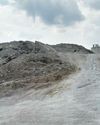
THE CIRCULARITY ARGUMENT
A circular economy can help India achieve its developmental aspirations while following the low-carbon pathway. It will also help address the challenges of waste management, pollution and overexploitation of natural resources. Industries are already innovating to reuse high-volume wastes and have shown that the transition can usher in both environmental and financial windfalls

Banking on flawed drug voluntary licences
The Medicines Patent Pool is pushing for more VLs, but its bad deal with Novartis on a cancer drug shows the pitfalls

Lasting solutions
For the first time, the UN has recognised the role of indigenous communities in tackling aridity. A repository of traditional knowledge India has the wherewithal to lead the way

IMD at 150
India's journey into modern weather forecasting took a decisive turn 150 years ago with the establishment of India Meteorological Department during the British rule. The agency has come a long way since then, shaping the way the country predicts and responds to its diverse climate challenges
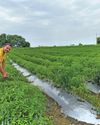
Every drop counts
In drought-prone Marathwada region, 14 villages have managed to counter water shortage by budgeting the resource
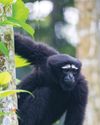
Threat to survival
Hollongapar Gibbon Sanctuary in Assam faces ecological challenges as railway electrification and hydrocarbon exploration endanger its fragile biodiversity

'Migration is going to be a battlefield'
AMITAV GHOSH is one of the foremost chroniclers of our times. His literary sojourn includes writings on topics that range from languages to climate change to human lives. His latest book, Wild Fictions, brings some of his works on these issues under one title. In a conversation with RAJAT GHAI, Ghosh shares his views on the future of human movement. Excerpts:
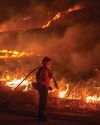
Face of future
California wildfires confirm forest fires are intensifying in a hotter world, emitting substantial amounts of greenhouse gases and reinforcing global warming
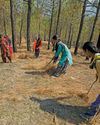
Friends of the forest
Residents of 30 villages in Uttarakhand establish a model for public participation in saving forests from wildfires

Climate-crazy playbook
Just hours after his second (and final) term began on January 20, US President Donald Trump unleashed 46 presidential actions. Several of these are centred on the US' climate commitments, energy transition, migration and trade policies, and are likely to have negative global implications